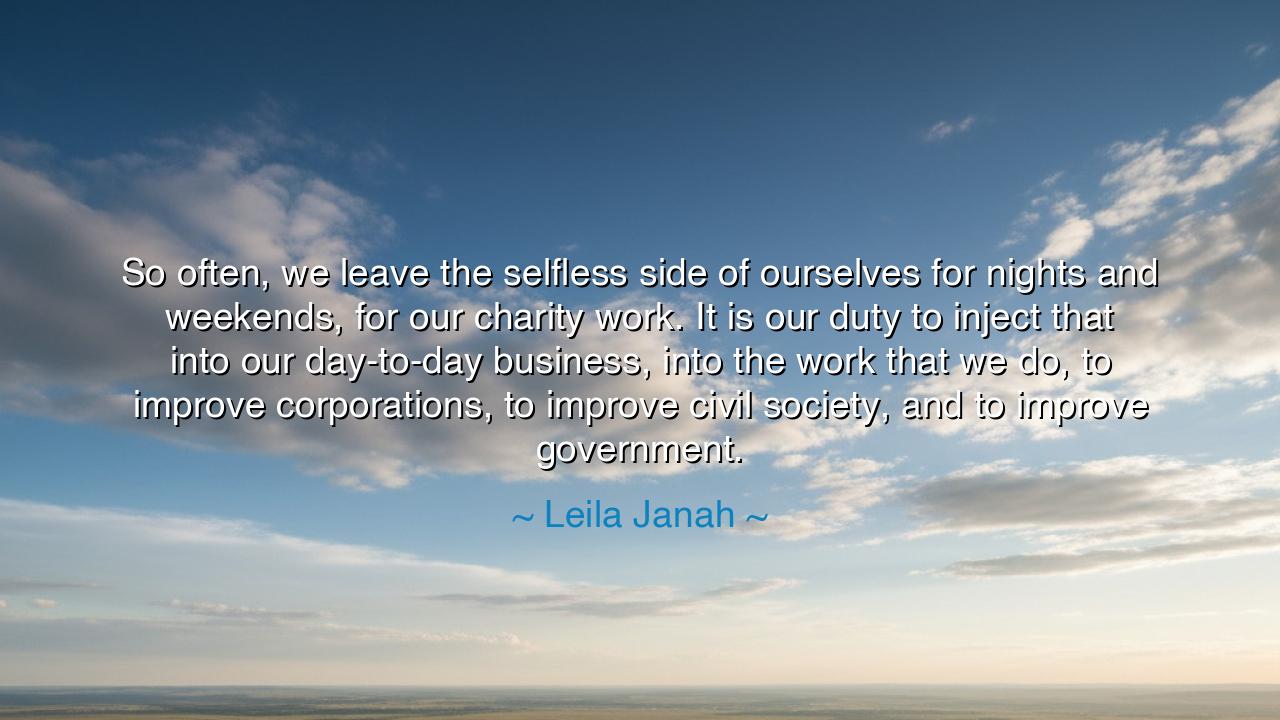
So often, we leave the selfless side of ourselves for nights and
So often, we leave the selfless side of ourselves for nights and weekends, for our charity work. It is our duty to inject that into our day-to-day business, into the work that we do, to improve corporations, to improve civil society, and to improve government.






The words of Leila Janah—“So often, we leave the selfless side of ourselves for nights and weekends, for our charity work. It is our duty to inject that into our day-to-day business, into the work that we do, to improve corporations, to improve civil society, and to improve government.”—resound like the call of a trumpet in the stillness. They awaken us to a truth that too many forget: that the virtues of compassion and service are not to be confined to moments of leisure or to the margins of our lives. They must dwell at the very center of our labor, shaping how we build, trade, govern, and lead.
The ancients would have said: what we do each day is the forge in which society is shaped. If selflessness is kept only for the temple, the soup kitchen, or the evening hour, then the world is built upon foundations of selfishness. But if the spirit of service is poured into business, into law, into the councils of power, then every structure of civilization becomes infused with light. Janah, who devoted her life to creating dignified work for the poor, reminds us that the boundaries between labor and service must be broken, and that duty is not occasional but continuous.
History gives us vivid proof of this wisdom. Consider the example of George Cadbury, the British chocolatier of the nineteenth century. Unlike many industrialists of his time, he infused his company with the selfless side of himself. He built not only factories but entire villages for his workers, providing homes, schools, and green spaces. He did not wait until the weekend to give; he wove generosity into the very fabric of his enterprise. The Cadbury company became more than a business—it became a community, and through it, the lives of thousands were lifted. Here we see the living truth of Janah’s words: when selflessness enters the marketplace, society itself is renewed.
Leila Janah’s own life was a testament to this principle. Through her work with Samasource, she sought not charity for the poor but opportunity—teaching that giving jobs with dignity was more powerful than handouts. She did not separate her selfless heart from her professional mission; she fused them into one, and in doing so, pioneered a new vision of business as a force for justice. Her words spring not from theory, but from the lived fire of one who carried compassion into contracts, into boardrooms, into every transaction of her life.
This teaching challenges us to confront our own hypocrisy. Too often we wear selflessness like a cloak, putting it on only when it is convenient, and setting it aside when profit, ambition, or daily routine demand otherwise. But Janah urges us to make it our duty—to let kindness govern our hiring, fairness shape our trade, integrity rule our politics. For if we do not, our corporations grow cold, our governments corrupt, and our societies brittle. The seed of renewal lies in the daily deeds of individuals who refuse to separate business from benevolence.
The lesson is clear: do not delay selflessness until the weekend. Let it enter every meeting, every decision, every law passed and every wage paid. Ask yourself: does this action uplift others? Does this choice build justice, not only for myself, but for the many? If the answer is no, then the work is hollow. True greatness lies not in the wealth of a corporation or the power of a government, but in the measure of compassion woven into their daily workings.
Practically, this means rethinking our roles. The business leader can build structures that honor workers rather than exploit them. The civil servant can choose integrity over corruption. The teacher can carry kindness into the classroom alongside knowledge. Each profession holds the power to embody selflessness in its daily duties. If every man and woman lived thus, then indeed, as Janah declared, we would improve not only corporations but the whole of civil society.
Thus, her words stand as an enduring flame: “It is our duty to inject selflessness into our day-to-day work.” Take them as counsel for your own life. Do not wait for evenings or weekends to serve. Make every task a vessel of kindness, every labor a gift to the world. In this way, your work will cease to be mere survival or profit—it will become part of the eternal structure of justice, built not in stone, but in the living hearts of humanity.






AAdministratorAdministrator
Welcome, honored guests. Please leave a comment, we will respond soon